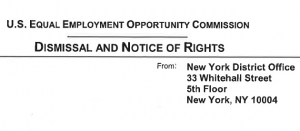Title VII of the Civil Rights Act prohibits employers from discriminating and retaliating against employees. Employers who violate Title VII may be subject to a lawsuit in federal court. Before filing a lawsuit, however, employees who believe their employer has violated the law must file a charge of discrimination with the Equal Employment Opportunity Commission or EEOC. But, is this rule a jurisdictional requirement or a procedural rule? Courts across the country have debated this, but on June 3, 2019, the Supreme Court of the United States settled the question. Today’s Long Island employment law blog explains the difference in the distinctions, SCOTUS’s decision, and the implications.
Title VII prohibits employment discrimination on the basis of race, color, religion, sex, or national origin. Further, Title VII prohibits employers from retaliating against employees who exercise their rights under the law. As part of Title VII, Congress included a requirement that aggrieved employees must file a charge of discrimination with the EEOC or local discrimination enforcement agency, before filing a lawsuit in federal court. Congress, however, did not expressly state whether this rule is a jurisdictional requirement or a procedural requirement. Because of this, federal courts across the country have been split on whether the rule is the latter or the former.
What’s the difference between a jurisdictional requirement and a procedural requirement? It’s not merely an academic point. Jurisdiction is a rule which allows a federal court the authority to hear a case. Jurisdiction can never be waived. In other words, if a court does not have authority to hear the particular kind of case before it, a party can raise the issue at any point during the litigation. In fact, a court may raise the issue on its own and may dismiss a case if it decides, at any point, that it does not have jurisdiction to hear the matter.
On the other hand, procedural rules exist to “promote the orderly progress of litigation.” In other words, procedural rules are put in place to ensure lawsuits progress in a proper manner. Procedural rules do not give the court authority to hear the case, though. In other words, if a rule is procedural, but not jurisdictional, courts have more leeway in deciding whether failure to follow a rule means a case should be dismissed or whether the failure should be overlooked.
Specifically as to Title VII, if the charge filing rule is considered jurisdictional, then employees who fail to properly file a charge of discrimination before filing a lawsuit means that the federal court has no authority to hear the case. Thus, the case must be dismissed at any point when it is discovered that the charge was not properly filed, or not filed at all. But, if the charge filing rule is procedural, then an employer would have to raise the issue with the court as early as possible, or risk waiving an objection about the charge.
In Fort Bend County v. Davis, a municipal employee completed an EEOC intake questionnaire and then, a month later, a formal EEOC charge. The employee alleged her supervisor had sexually harassed her and then another supervisor retaliated against her.
After the charge was filed, a new supervisor ordered the employee to work on a Sunday. The employee objected, stating she had a church obligation on Sunday. When she did not return to work, she was fired. The employee added a claim of religious discrimination and retaliation to her EEOC intake form, but not to her formal charge of discrimination. Months later, the EEOC issued to the employee a “right to sue” letter allowing the employee to proceed in federal court.
The employee’s case proceeded through the trial court, had an appeal, and made a brief appearance at SCOTUS. Along the way, the defendants had never before challenged that the employee met the charge-filing requirements. But, years into the case and after it was remanded to the trial court, the employer asked the court to dismiss the religion discrimination charge on the basis that the employee did not properly allege the claim in her charge of discrimination.
The District Court determined that the charge filing requirement is jurisdictional, so the objection can be raised at any time. The Court dismissed the employee’s case. But, the appellate court reversed and determined that the rule is merely a prerequisite to suit and the employer waived the defense by waiting too long to assert it.
On appeal to the Supreme Court, Justice Ginsburg delivered the unanimous decision of the Court. Justice Ginsburg held that federal courts have subject matter jurisdiction over Title VII cases pursuant to (1) Congress conveying to federal courts subject matter jurisdiction over cases concerning “federal questions” and (2) the jurisdictional provision of Title VII. Based on the other statutory provisions of jurisdiction, the Court determined that the charge filing requirement related only to a “party’s procedural obligation.”
The Court summarized its decision by nothing that rules may be mandatory without being jurisdictional. It means litigants must still follow the rules, but objectors still have recourse by acting timely to raise the objection.
If you have questions about the EEOC, Title VII, charges of discrimination, right to sue letters, or the Fort Bend decision, contact a Long Island employment discrimination and retaliation lawyer at Famighetti & Weinick PLLC at 631-352-0050. Our website is at http://linycemploymentlaw.com.

Charge of Discrimination
 Long Island Employment Law Blog
Long Island Employment Law Blog

